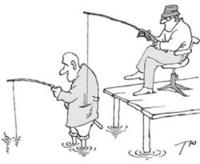In a
paradoxical way, from the point of view of international division of
labor, Ukraine and Russia, just as in the Soviet period, make up an
integral whole. After 1991, Russia, with its enormous natural
resources, became a supplier of raw materials and energy for the West.
But not all these resources can simply be sent straight out; indeed,
from the standpoint of Europe's economic interests, it makes more sense
that part of the energy in question be consumed in its country of
origin, in making labor-intensive, fuel-intensive and ecologically
harmful products that can then be moved along to the West. This is
Ukraine's specialty.
Without Russia, Ukrainian industry makes no sense, while for the
Russian raw materials economy Ukraine represents not only a transit
corridor but also an important staging area -- an advance outpost on
the road to Europe. It is this, and not some mythical blood kinship or
linguistic unity, that predetermines the invariable pro-Russian
orientation of the eastern and southern parts of Ukraine. People speak
better Russian in Kiev than in Donetsk.
But it isn't the purity of Russian that determines policy and politics.
It is economic interests. So the real blow delivered by Moscow's policy
was absorbed by the Russian-speaking regions of Ukraine. They use the
larger share of imported fuel. The largest share of industry is
concentrated there, as is the more urbanized population that depends
more on a central supply of fuel. And Ukraine's own fuel sources are
located precisely in the west, which has a self-sustaining energy
capability.
Demanding $230 for gas instead of $50 is the same as demanding Ukraine
close down its economy and furlough the population. Which was
understood in Moscow no worse than in Kiev. But it's another thing
altogether to see that Russian industry could not gain great advantages
from the bankruptcy of its western neighbor. The Russian metallurgical
industry could not win new markets for itself after a production halt
in Ukraine -- as it is now Russian productive capabilities are used
only on a by-order basis. For the construction of new enterprises
considerable investment would be necessary. Thus the interests of
Russian companies that had already poured funds into Ukraine were put
at risk.
The Kremlin clearly felt it could pressure Kiev via the European Union.
The Putin people were fairly chortling at the prospect of watching
Ukrainians and Western Europeans bump heads. But that kind of game
requires real nerve and a fairly large degree of independence from the
West. Moscow's policy would only have been effective if Gazprom had
categorically refused to compensate the Europeans for the fall-off in
deliveries: We held up our end of things, they could have said; if the
gas doesn't go through, blame Ukraine. But having announced their
intention to compensate for gas lost over Ukraine, Moscow assumed de
facto responsibility for the situation. After a few days, it turned out
that Russia's attempt to have its way with its western neighbor had
misfired, producing nothing. And the irritation of the Europeans was
directed not at Kiev but at the Kremlin.
As you would expect, feeling pressure from the West, Moscow immediately
did an about-face, covering itself with an attractive compromise.
Ukraine was to have a price that gave Russia a minimal profit yet
represented the maximum that the user industries could pay.
What was all this really about? Please, we can do without fairy tales
about an "argument between managerial entities." The decision to launch
this war was political, just as was the decision to retreat quickly. Of
course the bureaucratic incompetence of the Kremlin bosses and their
devotion to market fundamentalism can't be dismissed from the equation.
But internal political considerations played no less a part than
economic interests did.
The rulers of Russia are slowly and uncertainly trying to construct a
new "national ideology." This ideology needs an enemy. And Ukraine is
just the kind of enemy that meets the appropriate criteria of size and
ideology for contemporary Russia's capabilities. Enmity with Ukraine
reemphasizes the destruction of the Soviet Union (not only in a formal
political sense, but in economic and cultural terms) -- which is the
general strategic goal of both the post-Soviet elite in Moscow and the
imperial leadership in Washington.
Boris Kagarlitsky is director of the Institute for Globalization Studies.
http://www.themoscowtimes.com/stories/2006/01/12/008.html
 Boris Kagarlitsky
Boris Kagarlitsky